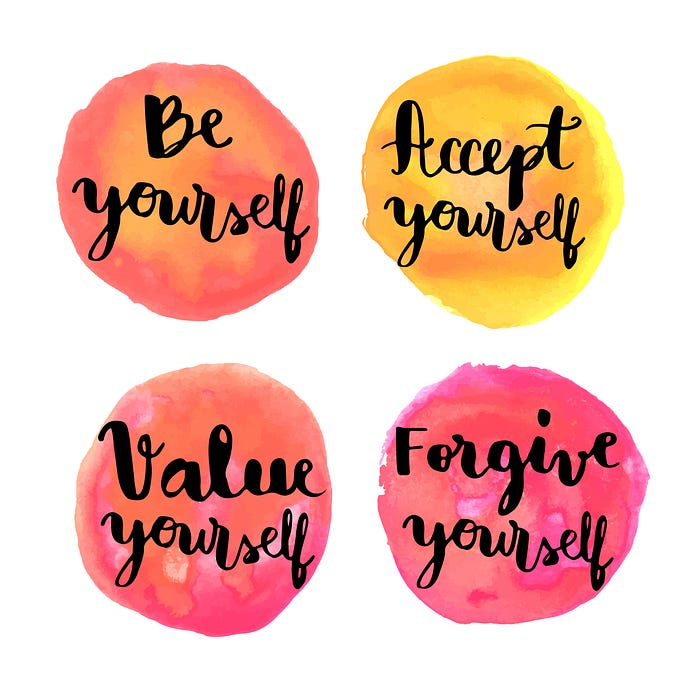Self-Acceptance and Mental Health

“Wanting to be someone else is a waste of the person you are.”
― Marilyn Monroe
Do we accept every version of ourselves? The perfect and the flawed ones?
The truth is, self-acceptance doesn’t always come naturally. A lot of us face trouble accepting our true and entire selves. It’s easy to love the good parts, but what about the parts that we aren’t completely okay with?
A lot of inner conflict arises when we reject who we really are. And while we know that accepting who we are is the right thing to do, we may find that it’s easier said than done.
In this article, we look at what it means to accept oneself. We also explore the relation between self-acceptance and mental health. But let’s start with what self-acceptance means.
So, what is self-acceptance?
Self-acceptance is the state or act of understanding and recognizing one’s abilities and limitations. It is a realistic and subjective understanding which is the gateway to a happier and more peaceful life.

When we don’t accept ourselves, we lose the power to embrace every part of our true identity. We don’t feel good about ourselves. Or we feel like we need to hide certain parts of ourselves. This most often leads to feelings of guilt and shame. This is fertile ground for mental health issues.
The difference between self-esteem and self-acceptance
People often confuse ‘self-acceptance’ with ‘self-esteem’. The two are related, but different.
Self-esteem is the ability to see our worth.
- It doesn’t depend on what others think about us. It depends on what we feel, believe, and think about ourselves.
- A healthy self-esteem gives us a positive perspective; it makes us feel confident.
- On the contrary, when we have low self-esteem we focus more on our weaknesses. It makes us believe that others are better than us.
- Self-esteem isn’t fixed and can change over time. Major life events, uncertain and challenging times can impact our self-esteem. For example, experiences like failing an exam, losing a job, or a breakup can affect our self-esteem for the worse.
Self-acceptance on the other hand is non-judgmental and unconditional acceptance of who we are.
Self-acceptance is unconditional. This means that no matter what occurs in our life, self-acceptance doesn’t change. Even if we lose a job, get divorced, or lose all our wealth.
When we truly accept ourselves, we learn to acknowledge our flaws even in difficult times. We don’t have to be in love with those flaws, we just need to recognize and accept them for what they are.
This is hence different from ‘destination happiness’ (which is basically not being happy with where we are in life, and making our happiness dependent on a destination in the future; for example, ‘I’ll be happy if/when I lose weight’ or ‘I’ll be happy when I earn this much money.’)
So you see how self -esteem and self-acceptance are related but different concepts?
Remember: Without self-acceptance, we can’t have a healthy self-esteem.
Why do we need to learn to accept ourselves?
“The worst loneliness is to not be comfortable with yourself.”
― Mark Twain
Everyone is unique in their own way. Some of us feel shy to talk to people. Others can’t spend a day without friends and family. Similarly, while some people have a good sense of humour, others are very serious about life.

No matter how different we are, it’s important to accept every bit of our uniqueness.
Here are a few reasons why it is crucial to accept who we are.
- In the hyper-connected world of social media, we often end up comparing ourselves with our friends, colleagues, or even neighbours. This can impact our mental health adversely. When we truly understand and accept ourselves, it makes our self-confidence unshakable. This helps to maintain our sanity.
- Human beings have an intrinsic need for approval. However, depending on social validation or approval from others can very soon go to extremes. It can often be very unhealthy. When we accept ourselves, this need for approval and validation from others reduces. We are able to be content with who we are and what we achieve.
- Lack of self-acceptance can make us feel like a failure. It creates a negative feeling called self-depreciation. Self-depreciation is a feeling that makes us feel that we are not capable of love or anything positive. It can eventually lead to anxiety, stress, and even depression.
- We can’t always control what happens in life. Accepting ourselves can allow us to refrain from judging and blaming ourselves when things go wrong.
It’s important to clarify however, that self-acceptance is not a justification for inappropriate behaviour.
Instead, self-acceptance can allow us to see our own shortcomings more clearly and honestly. It can enable us to work on them, if we choose to.
How do we initiate the journey of self-acceptance?
Accepting our entire self is not something that happens overnight. Learning to accept oneself is a process that takes a lot of hard work and inner strength. However, it is a journey worth the effort.

Here are a few pointers on how you can start your journey of self-acceptance.
- Have compassion for yourself: We are often our own worst critics. No one has the power to pass judgement on us more than our own selves. That’s why it’s important to identify and change the negative voice inside our heads. We must learn to embrace our flaws and be patient with ourselves. Being empathetic towards our own life problems, choices, and weaknesses can allow us how to really enjoy the journey of life.
- Embrace imperfections: Nothing and no one is perfect. In fact, we must also question where our definition of ‘perfect’ comes from. Instead of running after perfection, it’s important to celebrate our imperfections, as that is what is unique to us and is what makes us human.
- Face your fears: Facing our fears can help us understand our strengths and weaknesses. We should actually explore opportunities or experiences that make us afraid so that we are able to know and accept ourselves more fully.
- Positive self-talk: Positive self-talk and affirmation are great tools to build self-acceptance. Each morning we can repeat some positive affirmations to remind us how to accept ourselves. Some positive affirmations you can use are “I am smart”, “I am kind, I love the people around me”, “I deserve more happiness in life and I have the strength to work for it,” and so on.
- Forgiveness: There’s nothing more courageous than forgiveness. We need to learn to forgive both others and ourselves. Forgiveness can bring about massive changes in our personalities and behaviour.
- Ask questions: Asking questions is another powerful tool that can give us clarity. We should keep asking uneasy questions to know how we are feeling, how we should behave, and what we can do to improve ourselves.
Here are a few questions we can ask ourselves to practise accepting ourselves.
- Can I live without people’s approval?
- Can I forgive myself while accepting my mistakes?
- Why do I need to accept myself?
- Can I handle rejection well?
- What are my strengths and weaknesses?
- Which aspects do I appreciate about myself?
- What do my friends like about me?

To conclude…
“Because one believes in oneself, one doesn’t try to convince others. Because one is content with oneself, one doesn’t need others’ approval. Because one accepts oneself, the whole world accepts him or her.” — Lao Tzu
The definition of self-acceptance varies for each one of us. It depends on the different struggles we are facing in life. For example, a teenager with body-weight issues can learn to accept their imperfect body. A young man struggling to get a job can learn to accept himself by accepting that succeeding and failing are both important aspects of life.
We are all capable of achieving this state with some self-compassion. However, some of us may not have the emotional strength to accept our failures and mistakes. This can lead to severe mental illness. In such cases, we might need professional help to help us learn to accept ourselves to live well and stress-free.
Disclaimer: The content provided here is for informational and educational purposes only. Lokyatha has observed best effort due diligence and all health related content is reviewed by a trained professional before publishing. However, this should not and can not replace personalized medical help. Please refer to a professional in all cases of need.










